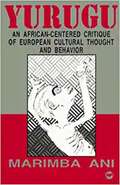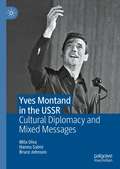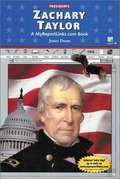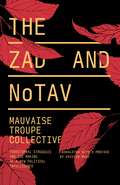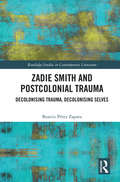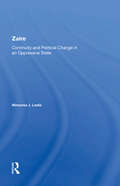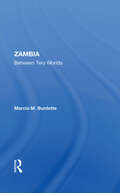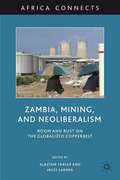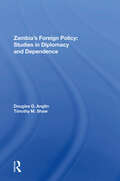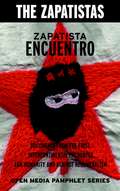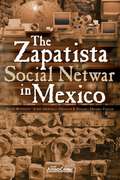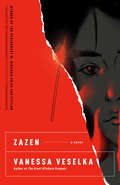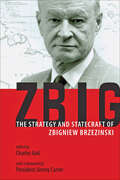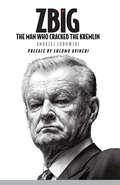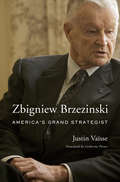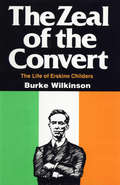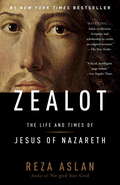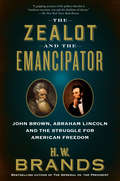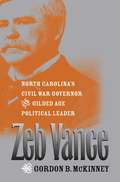- Table View
- List View
Yurugu: An Afrocentric Critique Of European Cultural Thought And Behavior
by Marimba AniYurugu removes the mask from the European facade and thereby reveals the inner workings of global white supremacy: A system which functions to guarantee the control of Europe and her descendants over the majority of the world's peoples.
Yves Montand in the USSR: Cultural Diplomacy and Mixed Messages
by Mila Oiva Hannu Salmi Bruce JohnsonThis volume is the first book-length account of Yves Montand’s controversial tour of the Soviet Union at the turn of the years 1956/57. It traces the mixed messages of this internationally visible act of cultural diplomacy in the middle of the turbulent Cold War. It also provides an account of the celebrated French singer-actor’s controversial career, his dedication to music and to peace activism, as well as his widespread fandom in the USSR. The book describes the political background for the events of the year 1956, including the changing Soviet atmosphere after Stalin’s death, portrays the rising transnational stardom of Montand in the 1940s and 1950s, and explores the controversies aroused by his plan to visit Moscow after the Hungarian Uprising. The book pays particular attention to Montand’s reception in the USSR and his concert performances, drawing on unique archival material and oral history interviews, and analyses the documentary Yves Montand Sings (1957) released immediately after his visit.
Z, 50th Anniversary Edition
by Marilyn Calmann Vassilis VassilikosA progressive parliamentary deputy is scheduled to appear at a political rally. Meanwhile, local political bosses plot his assassination. Thugs are recruited to disrupt the rally. Rumors begin to spread. But the forces already set in motion are irresistible. Z is the story of a crime, a time, a place, and people transformed by events.Z was published in Greece in 1966, and banned there one year later. It is based on an actual political assassination in 1963 in Salonika. The victim was Gregory Lambrakis, a socialist legislator and outspoken critic of the government. But Lambrakis's killers could not have anticipated the public response. His funeral became a political event; by the time the cortege reached Athens, 400,000 people were following the coffin in silence. In the nation's capital, the letter Z suddenly appeared on walls, sidewalks, posters--everywhere. Z stands for the Greek verb zei, "he lives."From the Trade Paperback edition.
Zacarias, My Brother: The Making of a Terrorist
by Abd Samad Moussaoui Florence BouquillatZacarias Moussaoui was arrested in the United States in August 2001. He is currently in a federal prison in Virginia, charged with "conspiring with Osama bin Laden and Al-Qaeda to murder thousands of innocent people in New York, Virginia, and Pennsylvania." Moussaoui , who trained to be a pilot in Oklahoma, admits to being a member of Al-Qaeda but denies involvement in the events of September 11. He has opted to defend himself. Written by his brother, Zacarias, My Brother tells the story of Zac's life from birth to the time in 1996 when he broke contact with his family and became deeply involved with Muslim fundamentalists in London. It is a unique document about what it is to grow up a Muslim in Western Europe today and how an extremist is made. In Zacarias, My Brother, author Abd Samad Moussaoui describes the struggle that young Arab men and their families endure in Europe, seeking an education and equal opportunity, only to find most avenues of assimilation effectively barred to people of color. At the same time, he authoritatively details the techniques of the extremist sects that recruit potential terrorist cadres. Members of the Wahhabi sect have perfected a rhetoric that appeals to the wounded pride of these young Arab men, Moussaoui writes--for example, offering funds to help them complete their education. Moussaoui deplores the route taken by his brother. He is not in any way an apologist for terrorism. Even so, he shows convincingly that normal young men can end up terrorists, and suggests how and why this happens. Moussaoui shows with gripping clarity how Wahhabism distorts true Islamic faith and the threat it poses to Islam. And his book strongly suggests that the best defense against terrorist groups like the Wahhabi sect in the future is anything people can do to end racism.
Zachary Taylor: Twelfth President of the United States
by David R. CollinsTraces the childhood, education, employment, political career, and presidency of the man nicknamed "Old Rough and Ready. "
Zachary Taylor: A MyReportLinks.com Book
by James M. DeemCovers the life, accomplishments, and political career of the American president Zachary Taylor.
The Zad and NoTAV: Territorial Struggles And The Making Of A New Political Intelligence
by Kristin Ross Mauvaise TroupeVivid account and reflection on two struggles that are at the heart of the contestation of neoliberal technocracy and the stateAt a time of ever more accelerated and expanded development of natural and agricultural territory, in the aim of making targeted areas more profitable and controllable, there are inhabitants who oppose these projects with a firm, unwavering NO. This is the case in Notre-Dame-des-Landes in western France and in the Italian Susa Valley, where decades-long battles have been mounted against high-speed transport infrastructure, an airport for one, and a high-speed train (TAV) between Lyon and Turin for the other.Each of these struggles embodies, with its own distinct style, original ways of merging life with combat. And they do so to such a degree that they are redesigning today the future of their respective regions and awakening immense hope outside of their own territories.This book recounts these two histories-in-the-making and gives voice to their protagonists. It was born of the intuition that these experiences and the hypotheses that emerge from them should circulate at the same time as the slogans and the enthusiasm, to strengthen the will to resist.
Zadie Smith and Postcolonial Trauma: Decolonising Trauma, Decolonising Selves (Routledge Studies in Contemporary Literature)
by Beatriz Pérez ZapataThis monograph analyses Zadie Smith’s White Teeth, On Beauty, NW, The Embassy of Cambodia, and Swing Time as trauma fictions that reveal the social, cultural, historical, and political facets of trauma. Starting with Smith’s humorous critique of psychoanalysis and her definition of original trauma, this volume explores Smith’s challenge of Western theories of trauma and coping and how her narratives expose the insidiousness of (post)colonial suffering and unbelonging. This book then explores transgenerational trauma, the tensions between remembering and forgetting, multidirectional memory, and the possibilities of the ambiguities and contradictions of the postcolonial and diasporic characters Smith depicts. This analysis discloses Smith’s effort to ethically redefine trauma theory from a postcolonial and decolonial standpoint, reiterate the need to acknowledge and work through colonial histories and postcolonial forms of oppression, and critically reflect on our roles as witnesses of suffering in global times.
Zahlungen für Ökosystemdienstleistungen: Zwischen Marktprinzipien und Kommunikation
by Kristin NicolausKristin Nicolaus erarbeitet in diesem Buch eine diskursdemokratische Perspektive auf Zahlungen für Ökosystemdienstleistungen (PES). Sie rückt die Kommunikationen und Möglichkeiten der Partizipation in den Mittelpunkt und analysiert – mittels qualitativer Inhaltsanalyse – 18 Entstehungsprozesse von PES in Deutschland und Großbritannien. Aus der empirischen Untersuchung ergeben sich Erkenntnisse, die bisher kaum Beachtung fanden und Aussagen darüber treffen, wie vielfältig PES zustande kommen und welchen Einfluss die jeweiligen Kontexte darauf nehmen. Die gewonnenen Einsichten setzen sich von bisher vorherrschenden Funktionslogiken ab und erweitern so das Bild von Zahlungen für Ökosystemdienstleistungen.
Zaire: Continuity And Political Change In An Oppressive State
by Winsome J LeslieThis book describes the historical setting of Zaire and focuses on economic and political developments during the Mobutu era. It examines the corrupt and closed political system, with its roots in the colonial state and precolonial political patterns.
Zambia: Between Two Worlds
by Marcia BurdetteThis accessible case study offers a fully rounded picture of Zambia's course since independence, chronicling the periods of boom and decline after the fall in the price of copper around the mid-1970s. The author advocates an internally oriented economic strategy to retain industries and livelihoods and investigates the ability of the current leadership to achieve this.
Zambia, Mining, and Neoliberalism
by Alastair Fraser Miles LarmerThis book paints a vivid picture of Zambia's experience riding the copper price rollercoaster. It brings together the best of recent research on Zambia's mining industry from eminent scholars in history, geography, anthropology, politics, sociology and economics. The authors discuss how aid donors pressed Zambia to privatize its key industry and how multinational mining houses took advantage of tax-breaks and lax regulation. It considers the opportunities and dangers presented by Chinese investment, how both companies and the Zambian state responded to dramatic instabilities in global commodity markets since 2004, and how frustration with the courting of mining multinationals has led to the rise of populist opposition. This detailed study of a key industry in a poor Central African state tells us a great deal about the unstable nature and uneven impacts of the whole global economic system.
Zambia's Foreign Policy: Studies In Diplomacy And Dependence
by Douglas G AnglinThis volume examines Zambia's role in the search for African independence, unity and development, particularly in the context of southern Africa. It also analyses the problems of dependence and underdevelopment and their impact on foreign policymaking. By concentrating on the key issues and major crises that confronted Zambia's decision makers during the nation's first years, the authors explain the country's current preoccupations and future prospects. Although their primary focus is on Zambia, they also treat a range of substantive and theoretical issues.
Zapatista Encuentro: Documents from the Encounter for Humanity and Against Neoliberalism, La Realidad, Mexico (Open Media Series)
by Zapatistas"Why is everyone so quiet? Is this the democracy you wanted?" So ask the Zapatistas, the group of indigenous Mexicans who, on January 1, 1994, mounted a rebellion against the implementation of NAFTA, political corruption, and the slow, unreported genocide of indigenous people worldwide. As the group expressed their demands and revealed their tactics, it quickly became obvious that they were less an armed guerrilla force seeking to seize state power, and much more a social movement seeking to catalyze civil society's full democratic power. For this reason Mexican political analyst Gustava Esteva has called the Zapatista rebellion "the first revolution of the 21st century." He explains that whereas the revolutions of the 20th century were tests for state power, the Zapatista struggle was for greater local autonomy, economic justice, and political rights within the borders of their own communities. Zapatista Encuentro contains documents and communiqués from Subcomandante Marcos - the leader of the Zapatistas - from the 1996 Encounter for Humanity and Against Neoliberalism. This remarkable event brought together 5,000 activists from all over the world to discuss how globalization (neoliberalism) affects us politically, culturally, economically, and socially.
The Zapatista "Social Netwar" in Mexico
by Melissa Fuller Graham Fuller David Ronfeldt John ArquillaThe information revolution is leading to the rise of network forms of organization in which small, previously isolated groups can communicate, link up, and conduct coordinated joint actions as never before. This in turn is leading to a new mode of conflict--netwar--in which the protagonists depend on using network forms of organization, doctrine, strategy, and technology. Many actors across the spectrum of conflict--from terrorists, guerrillas, and criminals who pose security threats, to social activists who may not--are developing netwar designs and capabilities. The Zapatista movement in Mexico is a seminal case of this. In January 1994, a guerrilla-like insurgency in Chiapas by the Zapatista National Liberation Army (EZLN), and the Mexican government's response to it, aroused a multitude of civil-society activists associated with human-rights, indigenous-rights, and other types of nongovernmental organizations (NGOs) to swarm--electronically as well as physically--from the United States, Canada, and elsewhere into Mexico City and Chiapas. There, they linked with Mexican NGOs to voice solidarity with the EZLN's demands and to press for nonviolent change. Thus, what began as a violent insurgency in an isolated region mutated into a nonviolent though no less disruptive social netwar that engaged the attention of activists from far and wide and had nationwide and foreign repercussions for Mexico. This study examines the rise of this social netwar, the information-age behaviors that characterize it (e.g., extensive use of the Internet), its effects on the Mexican military, its implications for Mexico's stability, and its implications for the future occurrence of social netwars elsewhere around the world.
Zarifa: A Woman's Battle in a Man's World
by Zarifa Ghafari Hannah Lucinda SmithA poignant memoir by one of Afghanistan's youngest female mayors and the inspiration behind the upcoming Netflix documentary, In Her Hands, executive produced by Hilary Rodham Clinton and Chelsea Clinton. Zarifa Ghafari was three years old when the Taliban banned girls from schools, and she began her education in secret. She was six when American airstrikes began. She was twenty-four when she became mayor – one of the first female mayors in the country – and first of Wardak, one of the most conservative provinces in Afghanistan. An extremist mob barred her from her office; her male staff walked out in protest; assassins tried to kill her three times. Through it all, Zarifa stood her ground. She ended corruption in the municipality, promoted peace, and tried to lift up women, despite constant fear for herself and her family. When the Taliban took Kabul in 2021, Ghafari had to flee. But even that couldn&’t stop her. Six months later, she returned, to continue her work empowering women. Zarifa is an astonishing memoir that offers an unparalleled perspective of the last two decades in Afghanistan from a citizen, daughter, woman and mayor. Written with honesty, pain, and ultimately, hope, Zarifa describes the work she did, the women she still tries to help as they live under Taliban rule, and her vision for how grassroots activism can change their lives and the lives of women everywhere.
Zazen
by Vanessa VeselkaFrom the author of the National Book Award longlisted epic The Great Offshore Grounds, here is the debut novel that launched her career—a story of activism, police violence, and white guilt in a not so distant dystopian America. &“An ambitious encapsulation of our modern times, Zazen tackles counterculture hipsters, geology, Buddhism, consumerism, terrorism, veganism, family drama, and, above all, love." —Judges' Citation, PEN/Robert W. Bingham Prize The world is on fire, and Della doesn&’t know what, if anything, she should do about it. The country is poised on the brink of war. Curfews and other restrictions give the police an excuse for violence. Customers at the vaguely vegan cafe where Della is working after dropping out of grad school debate which foreign countries are the best to flee to: Costa Rica? Bali? Della&’s parents—former revolutionaries—are more excited at the idea of her brother and his Black wife giving them biracial grandbabies than in engaging in any new actions; her nominally activist coworkers are mostly devoted to planning a massive sex party. Della floats between them, lost and numb. Then a bomb goes off: some shallow place of capitalistic worship demolished. Inspired, for reasons not entirely clear to herself, Della calls in a second—fake—bomb threat. But a bomb goes off there, too, and soon Della finds herself pulled in by a group of people who, for once, are promising to actually do something. No matter the consequences. Prescient when it was first published, Vanessa Veselka&’s debut novel is even more revolutionary now. A VINTAGE ORIGINAL.
Zbig: The Strategy and Statecraft of Zbigniew Brzezinski
by Charles GatiThe first comprehensive account of Zbigniew Brzezinski's complementary roles as author, academic, policy maker, and critic.Zbigniew Brzezinski’s multifaceted career dealing with U.S. security and foreign policy has led him from the halls of academia to multiple terms in public service, including a stint as President Jimmy Carter’s National Security Advisor from 1977 to 1981. He is a renowned policy analyst and author who frequently appears as a commentator on popular talk shows, and his strategic vision continues to carry a great deal of gravitas. in Zbig, Charles Gati has enlisted many of the top foreign policy players of the past thirty years to reflect on and analyze Brzezinski and his work. A senior scholar in Eastern European and Russian studies, Gati observed firsthand much of the history and politics surrounding Brzezinski’s career. His vibrant introduction and concluding interview with Brzezinski frame this critical assessment of a major statesman’s accomplishments.Contributors: Justin Vaïsse, David C. Engerman, Mark Kramer, David J. Rothkopf, Warren I. Cohen and Nancy Bernkopf Tucker, Robert A. Pastor, William B. Quandt, Robert Hunter, James Thomson, Patrick Vaughan, Marin Strmecki, James Mann, David Ignatius, Adam Garfinkle, Stephen F. Szabo, Francis Fukuyama, Charles Gati
Zbig: The Strategy and Statecraft of Zbigniew Brzezinski
by Charles Gati“Captures [Brzezinski’s] extraordinary insights into international politics as well as his commitment to a morally inspired political realism . . . superb.” —International AffairsZbigniew Brzezinski’s multifaceted career dealing with U.S. security and foreign policy led him from the halls of academia to multiple terms in public service, including a stint as President Carter’s National Security Advisor from 1977 to 1981. His strategic vision continues to influence our world today. To assess the ramifications of Brzezinski’s engagement in world politics and policy making, Charles Gati has enlisted many of the top foreign policy players of recent decades to reflect on and analyze the man and his work. A senior scholar in Eastern European and Russian studies, Gati observed firsthand much of the history and politics surrounding Brzezinski’s career. His vibrant introduction and concluding one-on-one interview with Brzezinski lucidly frame the book’s critical assessment of this major statesman’s accomplishments.“A highly readable volume of reflections on the legendary Cold Warrior by academics, journalists and Brzezinski's colleagues . . . A welcome addition to the field of political science.” —New Eastern Europe
Zbig: The Man Who Cracked the Kremlin
by Andrzej Lubowski"Kissinger opted for a strategy of accommodation with Moscow, while Brzezinski, claiming that the very nature of Soviet ideology and policies prevents stability, sought strategies for undermining the Soviet system. . . . In retrospect, Brzezinski was proven right and Kissinger was wrong." --Shlomo Avineri in the preface Zbigniew Brzezinski, widely regarded as a key actor in the last half-century of American foreign policy, remains a high-profile commentator on current events and an influential critic of some policies of subsequent administrations. His intellect and eloquent wit have made him an irreplaceable and controversial part of the American scene. He continues to fascinate historians, journalists, and conspiracy theorists. This is not a conventional doorstop biography. Instead, Zbig focuses on Brzezinski's critical and underappreciated contribution to the collapse of the Soviet Union--his lifelong mission. Utterly free of illusions about the nature of Communist power, Brzezinski advocated "peaceful engagement" as the best tactic for exploiting systemic Soviet vulnerabilities. His stand on human rights and his tutelage of and influence on President Jimmy Carter had a profound effect on the course of the Cold War.Zbig also compares Brzezinski with his Harvard rival, Henry Kissinger--a strong proponent of realpolitik. Brilliant as Kissinger is, he did little to change American perceptions of the world in a lasting way. Brzezinski did.
Zbigniew Brzezinski: America’s Grand Strategist
by Justin VaïsseAs National Security Adviser to President Jimmy Carter, Zbigniew Brzezinski (1928–2017) guided U.S. foreign policy at a critical juncture of the Cold War. But his impact on America’s role in the world extends far beyond his years in the White House, and reverberates to this day. His geopolitical vision, scholarly writings, frequent media appearances, and policy advice to decades of presidents from Lyndon Johnson to Barack Obama made him America’s grand strategist, a mantle only Henry Kissinger could also claim. Both men emigrated from turbulent Europe in 1938 and got their Ph.D.s in the 1950s from Harvard, then the epitome of the Cold War university. With its rise to global responsibilities, the United States needed professionals. Ambitious academics like Brzezinski soon replaced the old establishment figures who had mired the country in Vietnam, and they transformed the way America conducted foreign policy. Justin Vaïsse offers the first biography of the successful immigrant who completed a remarkable journey from his native Poland to the White House, interacting with influential world leaders from Gloria Steinem to Deng Xiaoping to John Paul II. This complex intellectual portrait reveals a man who weighed in on all major foreign policy debates since the 1950s, from his hawkish stance on the USSR to his advocacy for the Middle East peace process and his support for a U.S.-China global partnership. Through its examination of Brzezinski’s statesmanship and comprehensive vision, Zbigniew Brzezinski raises important questions about the respective roles of ideas and identity in foreign policy.
The Zeal of the Convert: The Life of Erskine Childers
by Burke Wilkinson"Erskine Childers, one of the unsung heroes of Ireland's struggle for independence, was born in England, spent his boyhood in Ireland, then went to Cambridge University. He fought for England in the Boer War and as an aviator in World War I, publishing his widely praised novel The Riddle of the Sands in 1903. He became involved in Irish politics in 1908 as an advocate of home rule, smuggled guns to Irish liberationists, and in 1919 joined Sinn Fein, the extreme wing of the freedom fighters. His martyrdom is stirringly related by Wilkinson". -- Publishers Weekly
Zealot: The Life and Times of Jesus of Nazareth
by Reza AslanFrom the internationally bestselling author of No god but God comes a fascinating, provocative, and meticulously researched biography that challenges long-held assumptions about the man we know as Jesus of Nazareth. Two thousand years ago, an itinerant Jewish preacher and miracle worker walked across the Galilee, gathering followers to establish what he called the "Kingdom of God." The revolutionary movement he launched was so threatening to the established order that he was captured, tortured, and executed as a state criminal. Within decades after his shameful death, his followers would call him God. Sifting through centuries of mythmaking, Reza Aslan sheds new light on one of history's most influential and enigmatic characters by examining Jesus through the lens of the tumultuous era in which he lived: first-century Palestine, an age awash in apocalyptic fervor. Scores of Jewish prophets, preachers, and would-be messiahs wandered through the Holy Land, bearing messages from God. This was the age of zealotry--a fervent nationalism that made resistance to the Roman occupation a sacred duty incumbent on all Jews. And few figures better exemplified this principle than the charismatic Galilean who defied both the imperial authorities and their allies in the Jewish religious hierarchy. Balancing the Jesus of the Gospels against the historical sources, Aslan describes a man full of conviction and passion, yet rife with contradiction; a man of peace who exhorted his followers to arm themselves with swords; an exorcist and faith healer who urged his disciples to keep his identity a secret; and ultimately the seditious "King of the Jews" whose promise of liberation from Rome went unfulfilled in his brief lifetime. Aslan explores the reasons why the early Christian church preferred to promulgate an image of Jesus as a peaceful spiritual teacher rather than a politically conscious revolutionary. And he grapples with the riddle of how Jesus understood himself, the mystery that is at the heart of all subsequent claims about his divinity. Zealot yields a fresh perspective on one of the greatest stories ever told even as it affirms the radical and transformative nature of Jesus of Nazareth's life and mission. The result is a thought-provoking, elegantly written biography with the pulse of a fast-paced novel: a singularly brilliant portrait of a man, a time, and the birth of a religion.
The Zealot and the Emancipator: John Brown, Abraham Lincoln, and the Struggle for American Freedom
by H. W. BrandsGifted storyteller and bestselling historian H. W. Brands narrates the epic struggle over slavery as embodied by John Brown and Abraham Lincoln—two men moved to radically different acts to confront our nation’s gravest sin. <P><P>John Brown was a charismatic and deeply religious man who heard the God of the Old Testament speaking to him, telling him to destroy slavery by any means. When Congress opened Kansas territory to slavery in 1854, Brown raised a band of followers to wage war. His men tore pro-slavery settlers from their homes and hacked them to death with broadswords. Three years later, Brown and his men assaulted the federal arsenal at Harpers Ferry, Virginia, hoping to arm slaves with weapons for a race war that would cleanse the nation of slavery. <P><P>Brown’s violence pointed ambitious Illinois lawyer and former officeholder Abraham Lincoln toward a different solution to slavery: politics. Lincoln spoke cautiously and dreamed big, plotting his path back to Washington and perhaps to the White House. Yet his caution could not protect him from the vortex of violence Brown had set in motion. <P><P>After Brown’s arrest, his righteous dignity on the way to the gallows led many in the North to see him as a martyr to liberty. Southerners responded with anger and horror to a terrorist being made into a saint. Lincoln shrewdly threaded the needle between the opposing voices of the fractured nation and won election as president. <P><P>But the time for moderation had passed, and Lincoln’s fervent belief that democracy could resolve its moral crises peacefully faced its ultimate test. The Zealot and the Emancipator is acclaimed historian H. W. Brand’s thrilling and page-turning account of how two American giants shaped the war for freedom.
Zeb Vance
by Gordon B. MckinneyIn this comprehensive biography of the man who led North Carolina through the Civil War and, as a U.S. senator from 1878 to 1894, served as the state's leading spokesman, Gordon McKinney presents Zebulon Baird Vance (1830-94) as a far more complex figure than has been previously recognized. Vance campaigned to keep North Carolina in the Union, but after Southern troops fired on Fort Sumter, he joined the army and rose to the rank of colonel. He was viewed as a champion of individual rights and enjoyed great popularity among voters. But McKinney demonstrates that Vance was not as progressive as earlier biographers suggest. Vance was a tireless advocate for white North Carolinians in the Reconstruction Period, and his policies and positions often favored the rich and powerful.McKinney provides significant new information about Vance's third governorship, his senatorial career, and his role in the origins of the modern Democratic Party in North Carolina. This new biography offers the fullest, most complete understanding yet of a legendary North Carolina leader.
